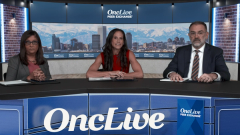
NEXICART-1: Safety and Efficacy of NXC-201 in AL Amyloidosis
Faculty offer insights on the NEXICART-1 phase 1 clinical trial investigating the safety and efficacy of NXC-201 in patients with AL amyloidosis and discuss potential clinical implications on the study’s findings.
Episodes in this series

This is a video synopsis/summary of a Peer Exchange involving Heather Landau, MD; Vaishali Sanchorawala, MD; and Jeffrey Zonder, MD.
A presentation at the American Society of Hematology meeting revealed promising data on B-cell maturation antigen (BCMA)-directed chimeric antigen receptor (CAR) T-cell therapy (NXC-201) for light chain (AL) amyloidosis. In a study involving 9 patients with a median of 6 prior lines of therapy, BCMA-directed CAR T cell achieved a 100% hematologic response rate, with 6 patients achieving complete hematologic responses. The median time to hematologic response was less than a month, and cytokine release syndrome was generally mild (grades 1 and 2). However, despite these positive outcomes, 6 patients died at a median follow-up of 7 months, with 1 death attributed to COVID-19 pneumonia.
The CAR T-cell therapy showed great efficacy with a favorable safety profile, demonstrating potential for AL amyloidosis treatment. Although challenges exist, including concerns about cardiac progression and immune fitness in patients with extensive prior therapy, the therapy’s impact on patients with amyloidosis not requiring ongoing treatment raises optimism. The results suggest a potential 1-shot solution for achieving durable hematologic responses and possibly improving organ responses, ushering in a new era in AL amyloidosis management.
Video synopsis is AI-generated and reviewed by OncLive® editorial staff.



































